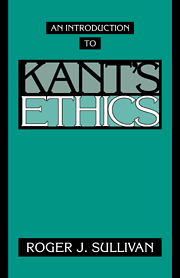Book contents
- Frontmatter
- Contents
- Introduction
- 1 A Beginning: Kant's Political Theory
- 2 The Categorical Imperative: The Ultimate Norm of Morality
- 3 The Formula of Autonomy or of Universal Law
- 4 The Formula of Respect for the Dignity of Persons
- 5 The Formula of Legislation for a Moral Community
- 6 The Limits of the Categorical Imperative
- 7 Morality and Prudence (Foundations 2)
- 8 Moral Character
- 9 Living under the Moral Law
- 10 The Defense of Morality (Foundations 3)
- Suggestions for Further Reading
- Index
8 - Moral Character
Published online by Cambridge University Press: 05 November 2009
- Frontmatter
- Contents
- Introduction
- 1 A Beginning: Kant's Political Theory
- 2 The Categorical Imperative: The Ultimate Norm of Morality
- 3 The Formula of Autonomy or of Universal Law
- 4 The Formula of Respect for the Dignity of Persons
- 5 The Formula of Legislation for a Moral Community
- 6 The Limits of the Categorical Imperative
- 7 Morality and Prudence (Foundations 2)
- 8 Moral Character
- 9 Living under the Moral Law
- 10 The Defense of Morality (Foundations 3)
- Suggestions for Further Reading
- Index
Summary
We can discuss the nature of character from either a theoretical or a practical point of view. From the theoretical, or empirical, point of view, that typically taken in the social sciences, we think of a person's character as consisting of inherited qualities modified by acquired habits and a wide variety of external influences such as family and education. From this point of view, we regard a person's character as completely explicable in terms of prior causal factors. Having admirable character traits, for example, may simply be a result of the right natural emotional inheritance together with good parenting and a supportive environment. If we could know all such influences, we should be able to predict exactly how a person would act in various situations.
Kant understood that anyone wanting to understand human conduct scientifically had to take the view that we, like the rest of nature, are causally determined; we can explain human behavior only if we can identify its causal antecedents. But as he also pointed out, this interpretation makes the notions of moral character and personal responsibility meaningless, for they both require that we be free, that is, able to exercise our agency without being causally determined (425–6).
We regard ourselves and the world from a practical point of view when, as agents, we think about acting or actually do so. From this point of view, we necessarily regard ourselves as free and responsible for the quality of our character.
- Type
- Chapter
- Information
- An Introduction to Kant's Ethics , pp. 130 - 148Publisher: Cambridge University PressPrint publication year: 1994



